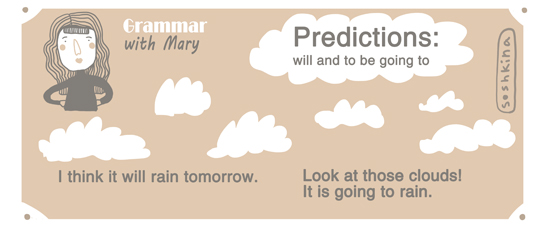Grammar with Mary. Predictions: will and to be going to
Hi! Are you ready to predict? Because today we're going to learn about predictions.
We use two constructions to make predictions about the future. I'll show you how:
1. I think it will rain tomorrow.
2. Look at those clouds! It is going to rain!
So, what constructions do we use to talk about predictions? Yes, you're absolutely right. We use to be going to and will.
What is the difference? When do we use which?
Let's figure it out.
In which case do we have evidence? Evidence is something that shows us what is going to happen in the near future. For example, clouds are evidence that it is going to rain soon.
Let's look at another example. We see a man walking on the street. He slips on a banana skin. What is going to happen?
Yes, he's going to fall. Why do we use going to? Because we have evidence – he slipped on the banana skin, so we are 100% sure that he is going to fall.
When we don't have evidence, we use will.
I think it will rain tomorrow, but I'm not sure.
It is just my opinion, I don't have any facts. So I use will.
Do you know who fortune-tellers are? They are people who tell you about your future. They look at your hand, they use a crystal ball to predict your future. But they don't have facts. They say: “You will have ten children.” But you don't know for sure, this is just a prediction, it's not based on facts.
However, if you see a pregnant woman, you can say that she is going to have a baby soon. Because you have evidence, you know that it's going to happen.
How many children do you think you will have? Or how many grandchildren?
What is the weather going to be like? Is it going to rain or snow?
Which country will win in the next Olympic Games?
What is going to happen if a student doesn't study for an important exam?
And now, here's my little prediction. You will have a wonderful day 
Thank you for listening to this podcast, and I hope that now you understand when we use will and going to for predictions.
















